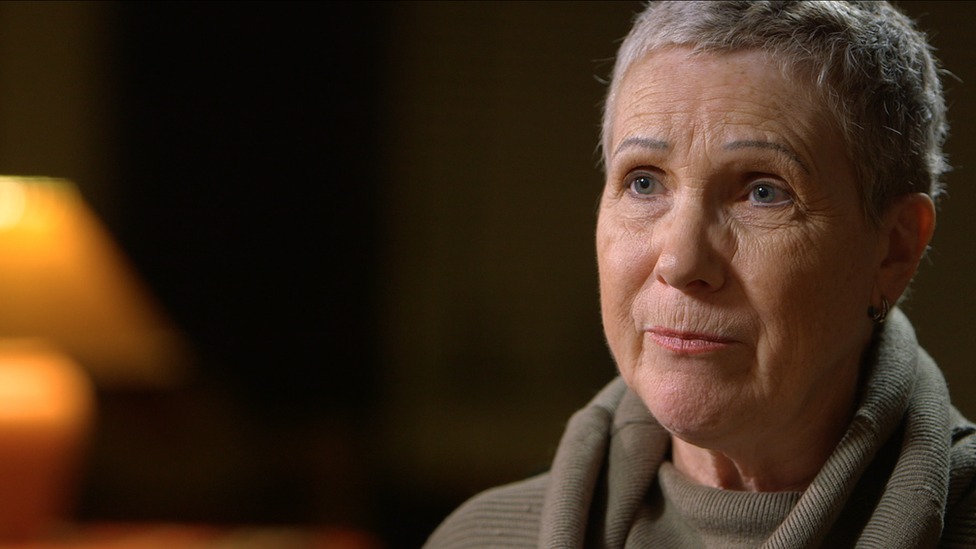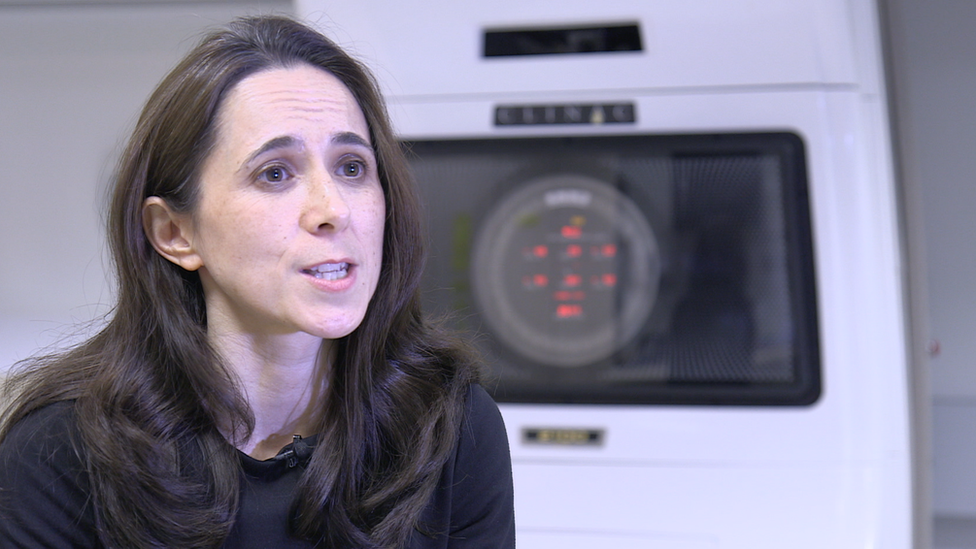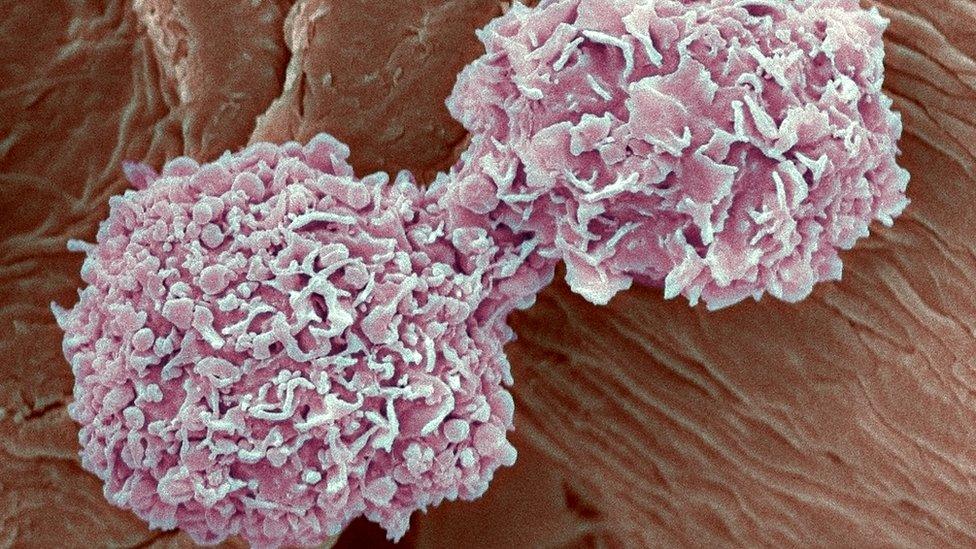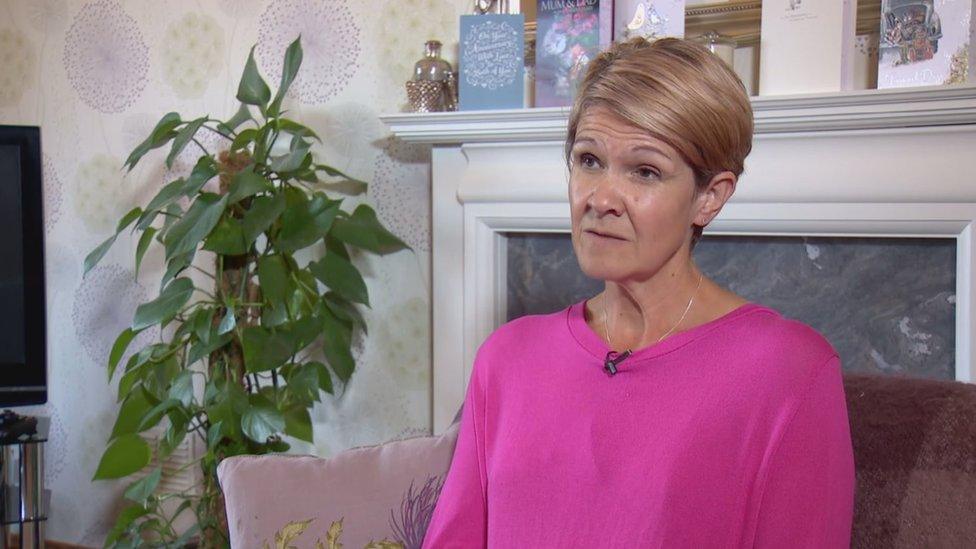Breast cancer patients' distress at withdrawal of Kadcyla
- Published
Bonnie Fox says she was "completely devastated" on finding Kadcyla was no longer available to NHS patients
Terminal breast cancer patients have spoken of their distress after learning that a life-extending drug they had been told would be available to them looks set to be withdrawn.
Advisory body NICE is reviewing drugs made available through the old cancer drugs fund, and has rejected Kadcyla for use on the NHS in England.
It believes the price per patient set by manufacturer Roche is too expensive. Roche says discussions are continuing.
One patient said the move felt "cruel".
In clinical trials, Kadcyla - £90,000 at full cost per patient - was shown to extend terminal breast cancer patients' lives by an average of six months, and to dramatically improve quality of life when compared with other treatments.
It is used to treat people with HER2-positive breast cancer that has spread to other parts of the body and cannot be surgically removed.
'Extra milestones'
Bonnie Fox, who is 39 and from Croydon, south London, told the BBC's Victoria Derbyshire programme that she had been informed by her oncologist that the drug would be available to her when her current drug became ineffective.
She said when she had discovered the drug was no longer routinely available on the NHS, she had been "completely devastated".
"I'm really dependent on those extra years... they could [help me achieve] extra milestones with my son, help me see him get to school," she said.
"To have that suddenly taken away feels so cruel. You know that drug is there, and you know that drug is good."
Patient Gill Smith said had been assured by her oncologist that Kadcyla would be available when she needed it.

Gill Smith says she was told the withdrawal of Kadcyla was "unthinkable"
"[My oncologist] said if Kadcyla were ever going to be withdrawn, they'd be chaining themselves to railings... it was unthinkable it would be no longer available."
The drug had been available through the old cancer drugs fund since 2014.
That was a ring-fenced fund set up by the government to help people in England access costly cancer drugs not routinely available on the NHS.
Call for review
But that fund was closed in March 2016 and replaced with a new approach to the funding of cancer drugs, which includes the so-called new-look cancer drugs fund.
Dr Mei-Lin Ah-See, a consultant in clinical oncology at the Mount Vernon Cancer Centre, criticised the failure of NICE to approve the drug for routine availability on the NHS.
She said it "not only comes at the expense of survival for our patients, but would come at the price of toxicity", as alternative drugs result in greater side-effects for patients.

Dr Mei-Lin Ah-See worries about the toxicity of other similar drugs
She said the UK Breast Cancer Group - a group of senior medical and clinical oncologists specialising in breast cancer treatment - would be writing to NICE to request that the decision should be reviewed and an accommodation found to keep the drug available for NHS patients.
More than 80,000 people have signed a petition, external - led by the charity Breast Cancer Now - calling on NICE and Roche to find a solution.
Carole Longson, of NICE, said the watchdog "knows how important it is for people with breast cancer that they have access to life-extending treatments, but the reality is the cost of this drug is too high relative to those benefits for it to be recommended for routine use".
A NICE spokesperson added: "NICE would like to be able to support the routine use of Kadcyla on the NHS and we are open to an approach from Roche with ideas about how they can make this happen.
"They have been in touch with us and we are arranging a further meeting with them, during the consultation period."
Richard Erwin, general manager for Roche UK, said: "This is not the end of the line for patients.
"We want to get back round the table with NICE to turn this preliminary decision around and ensure we all do the right thing for patients and their families."
Watch the Victoria Derbyshire programme on weekdays between 09:00 and 11:00 on BBC Two and the BBC News channel.
- Published16 November 2015

- Published15 September 2016
